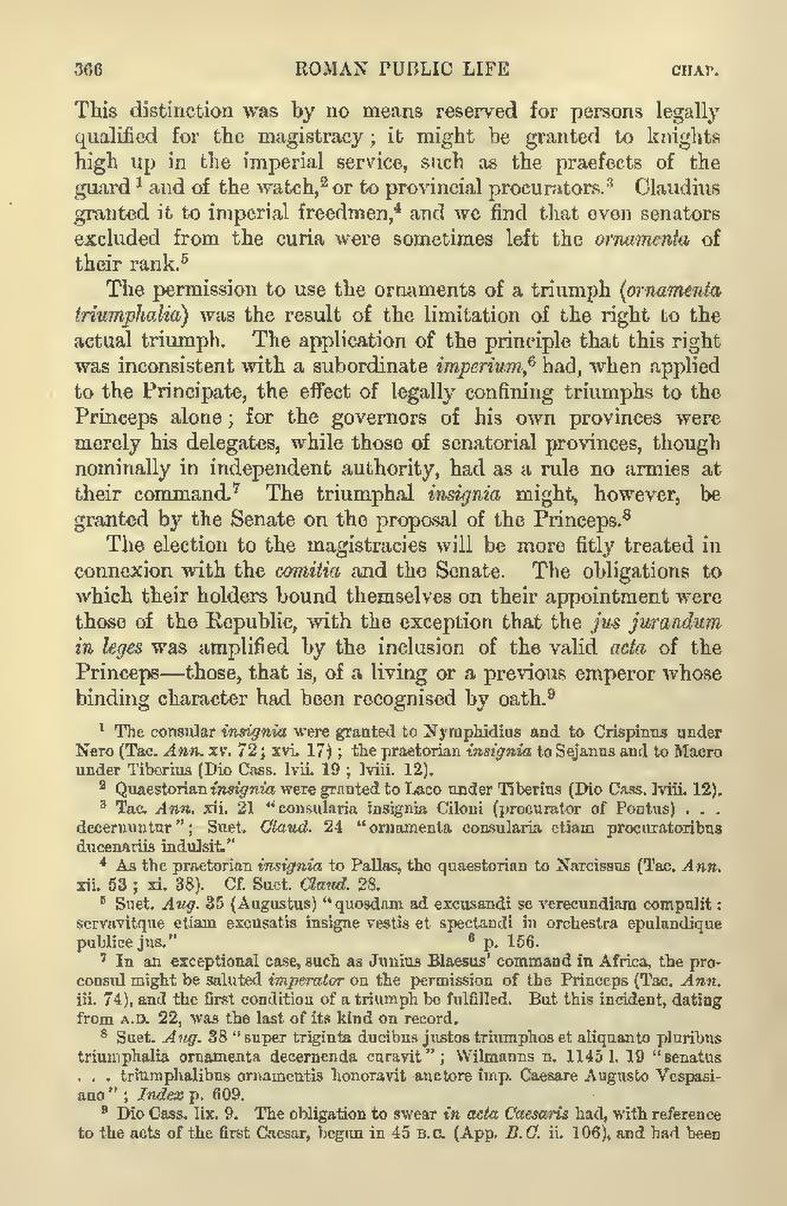This distinction was by no means reserved for persons legally qualified for the magistracy; it might be granted to knights high up in the imperial service, such as the praefects of the guard[1] and of the watch,[2] or to provincial procurators.[3] Claudius granted it to imperial freedmen,[4] and we find that even senators excluded from the curia were sometimes left the ornamenta of their rank.[5]
The permission to use the ornaments of a triumph (ornamenta triumphalia) was the result of the limitation of the right to the actual triumph. The application of the principle that this right was inconsistent with a subordinate imperium,[6] had, when applied to the Principate, the effect of legally confining triumphs to the Princeps alone; for the governors of his own provinces were merely his delegates, while those of senatorial provinces, though nominally in independent authority, had as a rule no armies at their command.[7] The triumphal insignia might, however, be granted by the Senate on the proposal of the Princeps.[8]
The election to the magistracies will be more fitly treated in connexion with the comitia and the Senate. The obligations to which their holders bound themselves on their appointment were those of the Republic, with the exception that the jus jurandum in leges was amplified by the inclusion of the valid acta of the Princeps—those, that is, of a living or a previous emperor whose binding character had been recognised by oath.[9]*
- ↑ The consular insignia were granted to Nymphidius and to Crispinus under Nero (Tac. Ann. xv. 72; xvi. 17); the praetorian insignia to Sejanus and to Macro under Tiberius (Dio Cass. lvii. 19; lviii. 12).
- ↑ Quaestorian insignia were granted to Laco under Tiberius (Dio Cass. lviii. 12).
- ↑ Tac. Ann. xii. 21 "consularia insignia Ciloni (procurator of Pontus) . . . decernuntur"; Suet. Claud. 24 "ornamenta consularia etiam procuratoribus ducenariis indulsit."
- ↑ As the praetorian insignia to Pallas, the quaestorian to Narcissus (Tac. Ann. xii. 53; xi. 38). Cf. Suet. Claud. 28.
- ↑ Suet. Aug. 35 (Augustus) "quosdam ad excusandi se verecundiam compulit: servavitque etiam excusatis insigne vestis et spectandi in orchestra epulandique publice jus."
- ↑ p. 156.
- ↑ In an exceptional case, such as Junius Blaesus' command in Africa, the proconsul might be saluted imperator on the permission of the Princeps (Tac. Ann. iii. 74), and the first condition of a triumph be fulfilled. But this incident, dating from A.D. 22, was the last of its kind on record.
- ↑ Suet. Aug. 38 "super triginta ducibus justos triumphos et aliquanto pluribus triumphalia ornamenta decernenda curavit"; Wilmanns n. 1145 l. 19 "senatus . . . triumphalibus ornamentis honoravit auctore imp. Caesare Augusto Vespasiano"; Index p. 609.
- ↑ Dio Cass. lix. 9. The obligation to swear in acta Caesaris had, with reference to the acts of the first Caesar, begun in 45 B.C. (App. B.C. ii. 106), and had been
